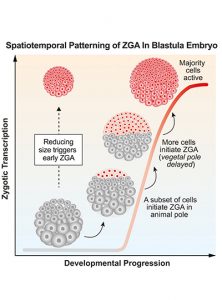
There is a transition during early development when an embryo undergoes biochemical changes, switching from being controlled by maternal molecules to being governed by its own genome.
For the first time, a team from the Perelman School of Medicine found in an embryo that activation of its genome does not happen all at once, instead it follows a specific pattern controlled primarily by the various sizes of its cells. The researchers published their results as the cover story in Developmental Cell.
In an early embryo undergoing cell division, maternally loaded RNA and proteins regulate the cell cycle. The genomes of the zygote—a term for the fertilized egg—are initially in sleep mode. However, at a point in the early life of the embryo, these zygotic nuclei “wake up” and expression from their genomes takes biochemical control over subsequent embryo development. But how an embryo “recognizes” when to undergo this transition has remained unknown.
“How an embryo ‘hands over’ control of development from mother to zygote is a fundamental question in developmental biology,” says senior author Matthew C. Good, an assistant professor of both cell and developmental biology and bioengineering. “Previously it was not appreciated that different regions of a vertebrate embryo can undergo genome activation at different times, or how directly cell size regulates the awakening of a zygote’s genome.”
Read more at Penn Medicine News.
